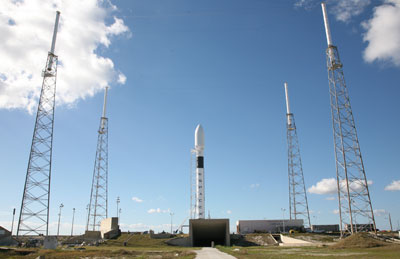What will you say if SpaceX’s test rocket fails?by S. Alan Stern
|
| The Falcon 9 is crucial in part because it has become a proxy for the success of the commercial space flight industry. |
The recent pivot in American space policy, tilting more of NASA’s human space flight efforts toward commercial spaceflight, has many supporters. Such supporters, myself included, cite the need to more quickly supplant Russian rides to orbit for our astronauts, to encourage the development of space tourism and other businesses in low Earth orbit, and to more economically transport crew and cargo to orbit so that we can afford human exploration of new worlds within NASA’s budget.
But transitioning some of NASA’s human space flight efforts toward commercial spaceflight providers also has many detractors. These detractors range from a few with vested interests in keeping space transportation costs high, to those hoping NASA will never lose its monopoly in being able to take Americans to space, to those who simply worry that SpaceX simply hasn’t had time to develop the hard-won lessons that our storied old school space firms have.
And indeed, the odds of Falcon 9’s first test flight failing, or at least not being 100%, successful, are high. After all, with rare exception, almost all of the more than 20 US orbital launch vehicles developed to date have failed, or otherwise fell short of complete success, in their early flights.
Fortunately, American rocket scientists, aerospace workers, and government officials are not quitters. We didn’t quit when Vanguard 1, with America’s first satellite aboard, exploded on its launch pad in 1957. We didn’t quit when early Atlas after early Atlas failed in qualification flights for the 1960s Mercury program. We didn’t quit in the 1970s when Space Shuttle main engine tests regularly ended in fires and explosions, and we didn’t quit in the 1980s when Challenger exploded with a crew of seven aboard early in the program’s history. We also didn’t quit when commercial space launch firms like Boeing and Sea Launch suffered failures in the 1990s and 2000s. To the contrary, in each case we Americans persisted, we redoubled our efforts, we picked ourselves up off the ground, and we resolved to keep at it until we succeeded, in front of the entire world.
And speaking of those who don’t quit, those who redouble their efforts and resolve to keep at it until success is achieved, it’s worth citing the history of SpaceX’s founder and CEO, Elon Musk.
| I cannot predict the outcome of Falcon 9’s first test flight, but I can predict one thing: that Musk and SpaceX won’t let an untoward outcome of the first Falcon 9 test flight stop them. |
Specifically, when Musk first entered the rocket building business as an Internet billionaire with a dream to help conquer space, a lot of people assumed he didn’t know how hard it would be. Perhaps. But when the first Facon 1 test mission ended in failure, he didn’t quit. When the second Falcon 1 also failed, Musk still didn’t give up. And when the third Falcon 1 test mission also failed, what did he do? He put his money where his mouth is and stuck to it, and built and put a fourth one on the launch pad, and sent it off to try again. The fourth try was a complete success. Detractors and competitors probably said, “It sure took a while.” But others recognized that Musk had what it takes—the steel in his spine to continue, even in the face of adversity, and to persist and persist until his firm made a success in the very hard business of launching to orbit. And by the way, the subsequent Falcon 1 flight succeeded as well.
Now Musk’s first Falcon 9 stands ready to make a maiden test flight. The Falcon 9 is a monster rocket by comparison to the Falcon 1. Many are lined up to predict possibility of a failure or partial success. Others stand ready to call a success only luck. I, on the other hand, stand ready to marvel at the gumption, the guts, and the true grit of Space X and leaders in like Musk, who risk it all—in public—for a worthy purpose.
Like you, I cannot predict the outcome of Falcon 9’s first test flight, but I can predict one thing: that Musk and SpaceX won’t let an untoward outcome of the first Falcon 9 test flight stop them.
Instead I predict that if adversity presents itself, Musk and SpaceX will stick to it, rising to the occasion, and continuing the development of the Falcon 9 until it’s successful, just as they did with Falcon 1.
That’s part of what makes our American space program so heroic, so much larger than life—for even when we fail—we don’t quit, we get back up and we dust ourselves off, and we show the world what we are made of.
What if the maiden test flight of Falcon 9 fails? What will you say?
